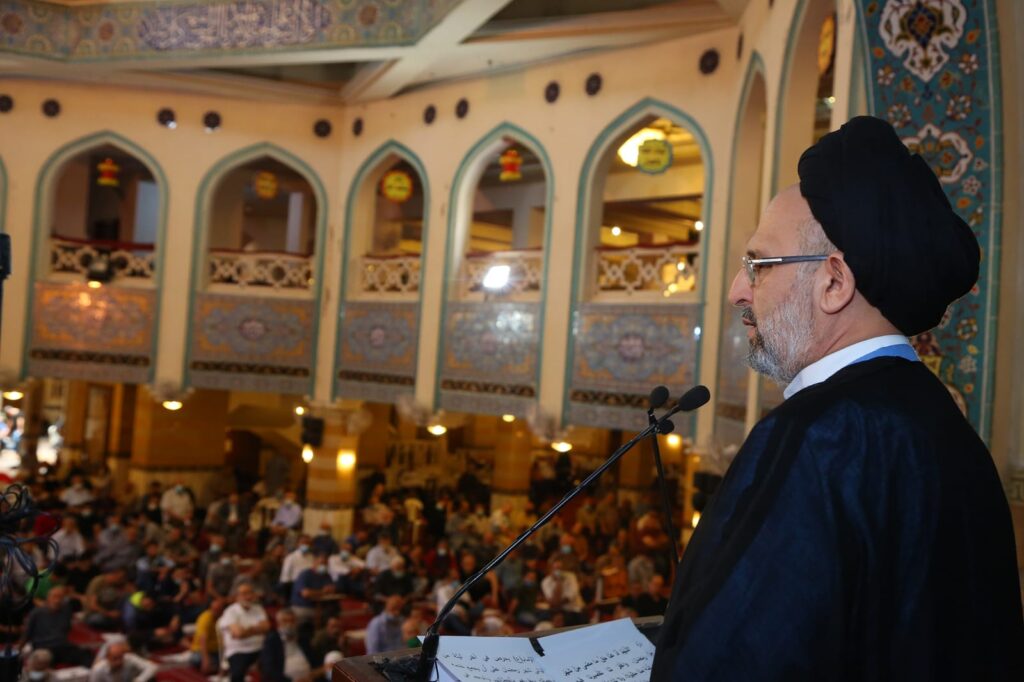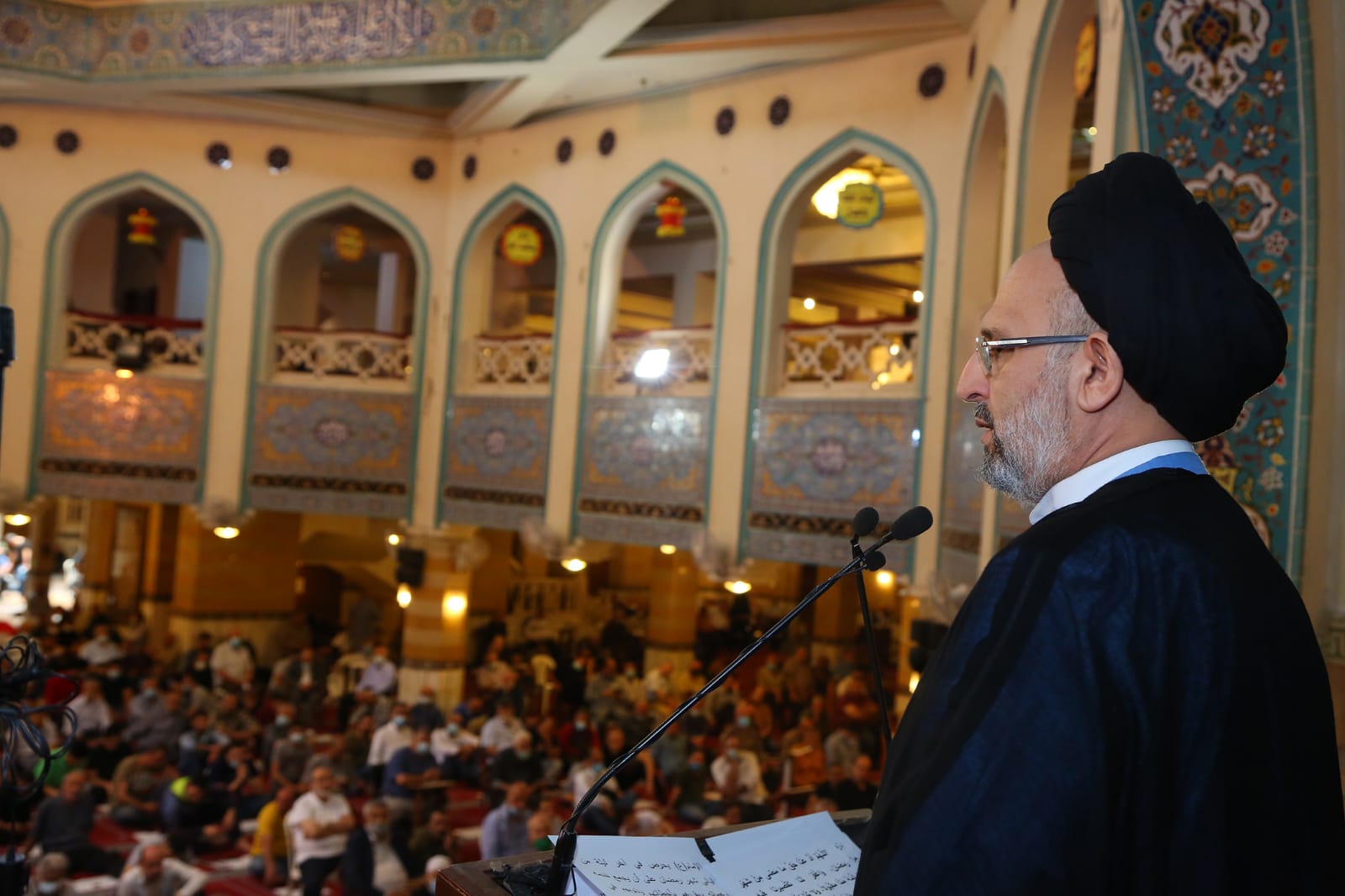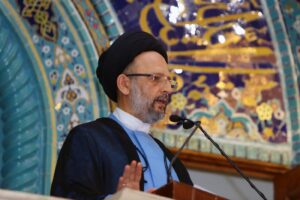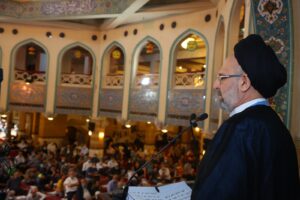In The Name of Allah, The Compassionate, The Merciful. The advice of Imam Al-Rida (a.s.)
His Eminence, Sayyed Ali Fadlallah, delivered the two Friday prayer sermons at the Imamain Al-Hassanain Mosque, Zul Qida 9, 1445 /May 17, 2024. Several prominent religious scholars, dignitaries, and hundreds of believers attended the Jumu’a prayer. Following is a summary of the sermons.
The First Sermon
Allah, the Most Exalted, says in His Glorious Book: We made them leaders who guide by Our command, and We revealed to them the doing of good deeds, the establishment of prayer, and the giving of zakat, and they were to Us devoted servants. Allah, the Most Exalted, speaks the Truth.
The eleventh of the month of Zul Qidah, is the blessed anniversary of the birth of Imam Ali ibn Musa al-Rida (a.s.). This Imam is one of the blessed chain of Imams of the Ahlul Bayt (a), who were honored by Allah, the Most Exalted, when He removed from them the impurity and purified them, and made them the trustees of the message of the Messenger of Allah (p.), and its preservers from error and deviation.
The title that was associated with his name, which is Al-Rida, indicated the status of this Imam (a.s.) in the hearts of the people; those who adhered to his imamate, or those who did not adhere to it, which was witnessed by those who lived with him, as expressed by Ibrahim ibn Abbas al-Suli when he said: “I have never seen or heard of anyone better than Abu al-Hasan al-Rida, and I saw from him what I did not see from anyone else. I never saw him offend anyone with his speech, nor did I see him interrupt anyone’s speech until he finished it, and he never turned anyone away from a need that he could fulfill. He was always smiling, reciprocating the bad with the good. And he slept little at night, and was very hospitable, and did not miss fasting for three days of the month… And he was very charitable and alms-giving in secret, and most of it was on dark nights.”
And we, on this blessed occasion, will stop at some of his positions that indicated his humanity, which we are in dire need of to enrich ourselves with and draw inspiration from in a reality where interests have become the controller of relations between people and their actions:
One day, Imam Ali ibn Musa al-Rida (a) invited a group of leaders, ministers, and dignitaries to a feast. It was early in his tenure as heir apparent. However, the Imam insisted on not sitting down until all the workers, servants, even the doorman and the horse groom, were invited. One of his companions said to him: “My master, why would you invite these people to a feast?! Your position as Imam of the Muslims and heir apparent, and the position of your guests who are of high status, are not compatible with sitting at the same table with these people. So why not set up a special table for them to sit at? “
The Imam replied: “Hold on, for the Lord is One, the mother is one, the father is one, and the reward is for deeds. God says: Indeed, the most honored of you in the sight of Allah is he who is most righteous among you
Through this behavior, the Imam (a) wanted to clarify the principle that governs the distinction between people, which should not be based on position, prestige, money, or the number of followers, but on piety and doing good, and on the extent of a person’s sincerity in the work he does, whether big or small, and on the humility that those who hold high positions should have. They should not see themselves above the people, but rather they should see that their position increases their responsibility before Allah Almighty, and that it increases their humility.
The Second Stance
On the Day of Arafat, it is reported that the Imam (a), who was in Khorasan, spent all his wealth on the path of Allah and for the poor and needy, leaving him with nothing. One of his companions, said to him: “You are a loser,”
The Imam replied: “No, it is the gain. Do not count as a loss what you seek reward and generosity for.” I did not lose it, but rather I deposited it with the One who will preserve it for me on the Day of Need, which is the Day of Judgment.
The Third Stance
This was referred to by one of his companions, al-Yasa’ ibn Hamza, who said: “I was in the gathering of Abu al-Hassan al-Rida (a.s.), and a large crowd had gathered to ask him about matters of their religion, when a man entered and greeted him and then said to him: I lost my money, and I do not have enough to reach my destination. Would you be kind enough to help me get home? And When I reach my home, I will give in charity what you give me, for I am not in a position to receive charity. The Imam said to him: Sit down, may God have mercy on you… When the people left, he went into his room and brought a bag containing an amount of money more than what the man needed, and gave it to him from behind the door, and then said to him: “Use it for your sustenance and expenses…, and do not give it in charity on my behalf. Go out, and do not let me see you or you see me.”
One of the Imam’s companions was surprised that the Imam covered his face from the man when he gave him the money. This might be natural if the money was little, out of shyness from this man, but he gave him a lot, so he said to him: “May I be your ransom, you have been generous and merciful, so why did you cover your face from him?”
The Imam replied: “For fear that I would see the humiliation of asking in his face for fulfilling his need.” I do not want to see him humiliated because I gave him charity…
Through this behavior, the Imam (a) wanted to clarify the principle that governs the distinction between people, which should not be based on position, prestige, money, or the number of followers, but on piety and doing good, and on the extent of a person’s sincerity in the work he does, whether it is big or small, and on the humility that those who hold high positions should have. They should not see themselves above the people, but rather they should see that their position increases their responsibility before Allah Almighty, and that it increases their humility.
This is just a drop in the ocean of the human nobility that Imam al-Rida (a) reached in giving and loving people, and caring for their dignity. In the logic of the Imam (a), a person cannot be a believer unless he overflows with good deeds towards others, giving, goodness, and humanity, by being like the sun that shines on people with light, the rain that descends on them with goodness, and the river that bears fruit wherever it passes. This is what his word expressed when he asked one of his companions: “Who is the best person in livelihood?” He said to him: My master, you know it better than me, so he (a.s.) said: “The one who improves the livelihood of others in his livelihood.” Then he asked him: “And who is the worst person in livelihood?” He said: You know, so he said: “The one who does not live for others in his livelihood.” Then he (a) said: “The worst of people is the one who withholds his giving and eats alone,” which is the one who is selfish and thinks only of himself, and does not feel that he must spread goodness to others by his existence.
Therefore, our commemoration of this anniversary does not come true except when we live all this human abundance that Imam al-Rida (a.s.) lived, which he reached the hearts and minds with.
We have become accustomed to commemorating the memories of the Ahlul Bayt (a) by holding celebrations and banquets, visiting them, holding Mawlids in times of joy, and mourning in times of sorrow. There is no harm in that, for there is blessing in it, but this commemoration will not achieve its goal unless we believe in the logic of the Imam , for when he was asked: How do we revive your cause? He said: ” You learn our knowledge and teach it to the people, for if the people know the merits of our speech, they would follow us.”
On this anniversary, let us turn to him and pledge to be in his image and example in this life, so that we may be worthy of belonging to him and his allegiance, asking God that we may be honored with his visit in this world and his intercession in the hereafter.
The second sermon
Worshippers of Allah, I advise you and myself to follow the advice of Imam al-Rida (a.s.), who said: “Faith is not complete for a servant until three characteristics are found in him: knowledge of religion, good management of livelihood, and patience in times of hardship.”
Through this advice, Imam al-Rida wanted to point to three elements that must be present in the personality of a believer. He urged them to be knowledgeable and aware of their religion, to manage their livelihood well, and to be patient in the face of adversity, not to be afraid or waver in their position and faith when faced with challenges.
We are in dire need of this advice to complete our faith and thus be more capable of facing the difficulties and many challenges of life.
We begin with Gaza, where the Zionist enemy continues to commit massacres and target both stones (buildings) and people, desiring to control it and, if possible, displace the remaining residents, without taking into account the increasing voices calling for a stop to this insane war, both from within the entity, reaching its security leadership and even its War Council, or from outside it, and from its supporting countries or the student protests and popular marches that sweep the world.
We have witnessed what happened and is happening in American and European universities, after the massacres committed by this enemy and the extent of the destruction it left behind, which is a disgrace to humanity. After this entity could not achieve any of its goals that it announced at the beginning of its war, we see its dilemma and impasse increasing day by day, as evidenced by the large numbers of casualties among its soldiers. This is due to the steadfastness of the Palestinian people, who prove their patience and perseverance every day, despite the depth of the wounds, pains, siege and genocide they are exposed to, and the heroic resistance of this people, with whom the entire sector, with its north, center, and south, has become a stage for its operations, even in places that the enemy previously entered and considered itself to be in control of.
We will not belittle the capabilities of this enemy or the support it receives from the countries that support it, which want it to emerge victorious from this battle and regain its deterrence power, so that it remains the strongest in this region. However, we are confident that a people with such will, steadfastness, and willingness to sacrifice cannot but frustrate the enemy’s goals and bring them down.
Facing this steadfastness and heroic resistance, we can only salute the Palestinian people, and with them all the voices that continue to rise in condemnation of this enemy and expose its crimes. We salute those who stand with them in the field and make sacrifices in this path, and who, based on their faith, national identity, and humanity, do not allow this entity, to dominate and achieve its goals there.
In the midst of all this, the Arab League met in Bahrain. The Palestinian people were expecting it to take practical stances in support of them, for its voice to be loud in the face of this Zionist entity, and to be on par with their steadfast resistance and the sacrifices they are making.
We did not expect this summit to declare war on this enemy, but we expected a decisive stance against it and its supporters, through the capabilities it possesses and the means of pressure it can exert if it cooperated and strengthened each other, or at the very least, to allow its peoples to express their solidarity with the Palestinian people and lend them a helping hand.
It is unfortunate that the conference did not come out, at this stage in which the Palestinian cause is facing its most difficult stages, except with a statement condemning this entity. Rather, we find those who are seeking to expand the circle of normalization with it, or those who place the blame for everything that happened on the Resistance, which may encourage this entity to persist in its war.
We come to Lebanon, where the Resistance continues its choice to support the Palestinian people and its active presence in confronting the enemy’s military machine and the systematic destruction practiced by this enemy on the border villages. It has made, and continues to make, great sacrifices from its field leaders and cadres, and offers a new lesson every day to this enemy who dreams of a new invasion of Lebanon, that Lebanon was not, and will not be, an easy target for this entity, and that it must think carefully before doing so.
In light of what is happening, we renew our call to the Lebanese people, with all their sects, and political positions, to see everything that is happening as protecting this nation from the enemy’s plot, now and in the future. Any targeting of the Resistance at this stage is a free service to the enemy and helps it achieve its goals in this country.
At the same time, we emphasize the need to work diligently to stop the political, economic, and security bleeding, due to the failure to fill the vacancies. This includes addressing the presidency and tackling issues that cannot be resolved in the absence of a fully functioning state, at the forefront of which is the file of Syrian refugees. This is to prepare for the upcoming phase when solutions will mature in the region.
In this regard, we commend the unified position taken by the Parliament on the issue of Syrian refugees. However, this will not have any positive impact unless there is agreement on taking practical initiatives towards decision-makers, both in Syria and in the countries that influence the Syrian reality and support the continued presence of Syrian refugees.
As for security, we appreciate the importance of the security measures taken by the security forces. However, this cannot be achieved without strengthening social security, as there is no security for a person without economic security.
This week, on May 15th, we commemorated the Nakba that occurred in Palestine, which brings back memories of its pains, tragedies, and the causes that led to it.
Here, we call for not just lamenting what happened, but for using all elements of strength and steadfastness to prevent the enemy from repeating the Nakba in our current era.
Finally, we meet on another occasion, the 17 May agreement, an agreement that was intended to mortgage the country. However, the hands of the resistance fighters wrote a new dawn for the country, bringing down this agreement. The first station for its downfall was the sit-in rejecting it, which was held at the Imam al-Rida Mosque (a) in Bir al-Abd, led by Sayyid Fadlallah (ra).





